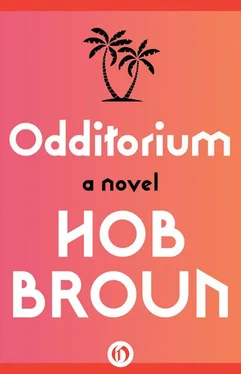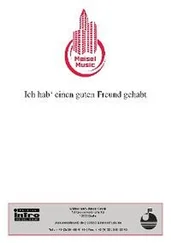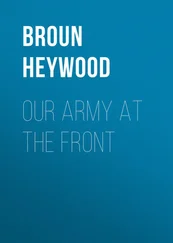Out in Bakersfield, things didn’t come so easy. Those California boys didn’t like him at all. They took him wide in the corners, pinched him back on the straightaways, and one night rode him right off the track into a cotton candy stand. It took a while for his ribs to mend. Karl was running right close to empty on cash and rooting for any kind of work when a pit groupie who adored his backwoods ways (“Oh honey, chew my lips till they bleed”) introduced him to a crewman from a thrill show called Jonny Apache’s Hell on Wheels.
The folks at Hell on Wheels didn’t like him much either, but they’d just lost a man to a poolroom knifing, were about to launch a six-week tour of the Southwest, and needed a driver badly.
“You take dope?” Jonny Apache said, chewing on a quartered lemon.
Karl said no.
“Pack a bag.”
So Karl became the number three man behind Jonny and his younger brother, Jerry. He opened the show with a few simple rolls, joined the brothers for some close-order precision driving, weaves and drifts and so on, and returned later to take part in the death-defying Sidewinder Crash. Jerry starred in this stunt, driving a junker with no glass and the door riveted shut. Jonny usually got on the public address himself to work the crowd. He told them how devoted he was to his baby brother and that even an old pro like himself knew fear. He told them that Jerry would not be wearing a helmet, that his only protection would be their prayers. Way up at the far end of the track, Jerry gunned his motor in a final salute. Ahead of him was a blazing firewall of pine boards, a ramp and another junker parked lengthwise beyond it on which he would land. As Jerry began his approach, left hand gripping the roof, a red bandana flapping in his fingers, Karl zoomed out of nowhere, hitting a 360 degree spin just at the far edge of the ramp as Jerry sailed over him and bellied down on that second junker.
It was a low risk stunt so long as the timing was right. Jonny had insisted on many practice runs employing a fifth wheel calibrated to measure delicate shadings of speed. There was a mere half-mile-per-hour tolerance either way. They did it a hundred and thirty-six times without a hitch. Until Flagstaff.
It was an evening show under floodlights and thousands of papery gray moths embroidered the air. Perhaps it was their erratic flight patterns that distracted him, or breasts in the crowd, but Karl lost it halfway through the first revolution and the front of his car swung out into Jerry’s descending path. He heard someone scream, “Look out,” then watched in fascination as Jerry’s left rear tire bounced on his hood, each serration in the black rubber distinct in that speck of transfixed time, imagining that Jerry could spin on end there forever, a human hood ornament. Karl let go of the wheel, covered his head and smacked into the parked junker, cracking one knee on the steering column. On its side, Jerry’s car slid through grass and dirt like the blade of a giant Rototiller, struck the retaining wall belly first and caught fire. Karl just sat there, blood running warm inside his pants leg, as two young studs from the crowd leaped over the wall, pulled Jerry out and smothered his flaming body.
Chaos in the emergency room. Jonny asked an intern to give Jerry’s wife a sedative. Shelly was on the floor, slamming a plastic ashtray against her head. And there was that gink from the crew, the one who had hooked Karl up in the first place, pushing past the security guard to announce that with his very own eyes he’d seen Karl pouring gin into his intermission Coke.
The bleakest tragedy of all was that Karl owned up when he didn’t have to.
“Jonny, I know how it looks …”
He saw the sudden deadening of faces, sensed the collective tensing of muscles, musk in the air, a circle of predators closing around him…. Just one little shot. Hardly more than a tablespoon. Not enough to slow his reflexes. Really. His head had been clear. Something just got away. You’ve got to believe it was an honest mistake.
But could there be such a thing as an honest mistake when a man lay packed in ice, horribly burned over three fourths of his body? When he would remain in pure agony for eleven days and nights before the ultimate relief?
Karl was all played out. Tildy undressed him and coaxed him to bed. Dutifully, without feeling, she stroked his nestled head as he rattled on, mumbling into the mattress as if the disaster was only hours old and he could still secure the forgiveness of that emergency room lynch mob.
Finally, as dawn arrived, he went to sleep. “I don’t feel guilty,” he said before slipping away. “I feel pursued.”
Tildy rallied herself under a hot shower and drank some orange juice with a raw egg whipped into it. Then she put on some clothes and got back in the car.
Nerves of steel in a bed of grease. Tildy walked the streets of Gibsonton waiting for something to open up. Illogically, the air cooled as daylight advanced. The sky took on the texture of overripe cheese, and mist came in on a westerly breeze. A thunderstorm to start the day? It might be nice, wash away all the muck. Tildy buttoned up her leather jacket.
She crossed and recrossed a vacant lot, gouging divots with her sneakers, then crouched to fill her pockets with stones. Aiming at the ceramic insulators of a telephone pole across the street, she threw them in rapid succession and scored a perfect zero. Her shoulder was tight, would not rotate smoothly.
Of the Cougarette fielders it was generally agreed that Tildy had the most accurate throwing arm, if not the strongest — that distinction belonged to Wanda Watts who had once shattered a shatterproof windshield at fifty yards. On grounders deep in the hole or to her backhand side Tildy could beat most runners by three or four steps, delivering the ball time after time to a perfect chest-high spot so That’s-Mary seldom had to move her glove more than an inch in any direction. Distressing to think this ability could have evaporated so fast.
Tildy sprinted awhile, trying to pump out the tar and nicotine with which she had lately been varnishing her lungs. Noticing a splash of light on the pavement ahead, she slowed, entered the Alhambra Diner, climbed on a rotating stool at the counter. The woman who poured her coffee without being asked had a wiry black beard that curved Ahab-style around her prominent jaw. Her husband, covering the grill with bacon strips for the breakfast stockpile, wore the briefest of tank tops, revealing portions of the classical tattoos that covered his torso: Botticelli’s Annunciation , Gainsborough’s Blue Boy, Diana and her Companions by Vermeer.
Inscribed glossies hung in clusters on the wall: “Captain Troy and his Amazing Trained Spiders”; “Mongo the African Methuselah”; “The Flying Arnheim Sisters”; “All the best from Apeman Adams, this Missing Link is missing you.”
“How’s business, Etta?”
“We’re holding up pretty well. Paid off that new freezer last month. Albert, give this child a couple pieces of bacon…. You look awful washed out, honey. Been getting enough sleep?”
“How much is enough?”
“The heat’ll take it right out of you.” Patting her chin, “I always give myself a trim this time of year.”
Albert lumbered over with some bacon in a folded paper napkin.” Who was the last National League infielder to be killed in a plane crash?”
“Tell me, Albert.”
“Kennie Hubbs of the Chicago Cubs. He was a demon with the glove.”
“You were saving that one for me, weren’t you?”
The door swung open and a young man in tinted aviator glasses blew in, snapping his fingers and singing.
“It’s just half past six
Waiting for rain in some burg in the sticks
Читать дальше












